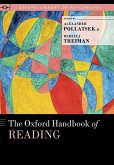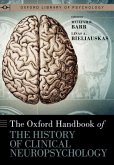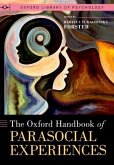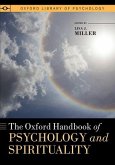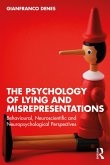The Oxford Handbook of Human Memory, Two Volume Pack
Foundations and Applications
Herausgeber: Kahana, Michael J; Wagner, Anthony D
The Oxford Handbook of Human Memory, Two Volume Pack
Foundations and Applications
Herausgeber: Kahana, Michael J; Wagner, Anthony D
- Gebundenes Buch
- Merkliste
- Auf die Merkliste
- Bewerten Bewerten
- Teilen
- Produkt teilen
- Produkterinnerung
- Produkterinnerung
The Oxford Handbook of Human Memory provides an authoritative overview of the science of human memory, its application to clinical disorders, and its broader implications for learning and memory in real-world contexts. Organized into two volumes and eleven sections, the Handbook integrates behavioral, neural, and computational evidence with current theories of how we learn and remember. Overall, The Oxford Handbook of Human Memory documents the current state of knowledge in the field and provides a roadmap for the next generation of memory scientists, established peers, and practitioners.
Andere Kunden interessierten sich auch für
![The Oxford Handbook of Reading The Oxford Handbook of Reading]() The Oxford Handbook of Reading220,99 €
The Oxford Handbook of Reading220,99 €![The Oxford Handbook of Social Cognition, Second Edition The Oxford Handbook of Social Cognition, Second Edition]() The Oxford Handbook of Social Cognition, Second Edition240,99 €
The Oxford Handbook of Social Cognition, Second Edition240,99 €![The Oxford Handbook of Compassion Science The Oxford Handbook of Compassion Science]() The Oxford Handbook of Compassion Science176,99 €
The Oxford Handbook of Compassion Science176,99 €![The Oxford Handbook of the History of Clinical Neuropsychology The Oxford Handbook of the History of Clinical Neuropsychology]() The Oxford Handbook of the History of Clinical Neuropsychology269,99 €
The Oxford Handbook of the History of Clinical Neuropsychology269,99 €![The Oxford Handbook of Parasocial Experiences The Oxford Handbook of Parasocial Experiences]() Rebecca Tukachinsky ForsterThe Oxford Handbook of Parasocial Experiences180,99 €
Rebecca Tukachinsky ForsterThe Oxford Handbook of Parasocial Experiences180,99 €![The Oxford Handbook of Psychology and Spirituality The Oxford Handbook of Psychology and Spirituality]() The Oxford Handbook of Psychology and Spirituality78,99 €
The Oxford Handbook of Psychology and Spirituality78,99 €![The Psychology of Lying and Misrepresentations The Psychology of Lying and Misrepresentations]() Gianfranco DenesThe Psychology of Lying and Misrepresentations42,99 €
Gianfranco DenesThe Psychology of Lying and Misrepresentations42,99 €-
-
-
The Oxford Handbook of Human Memory provides an authoritative overview of the science of human memory, its application to clinical disorders, and its broader implications for learning and memory in real-world contexts. Organized into two volumes and eleven sections, the Handbook integrates behavioral, neural, and computational evidence with current theories of how we learn and remember. Overall, The Oxford Handbook of Human Memory documents the current state of knowledge in the field and provides a roadmap for the next generation of memory scientists, established peers, and practitioners.
Produktdetails
- Produktdetails
- Oxford Library of Psychology
- Verlag: Oxford University Press Inc
- Seitenzahl: 1632
- Erscheinungstermin: 19. Juli 2024
- Englisch
- Abmessung: 295mm x 233mm x 181mm
- Gewicht: 5444g
- ISBN-13: 9780197746141
- ISBN-10: 0197746144
- Artikelnr.: 67734869
- Herstellerkennzeichnung
- Libri GmbH
- Europaallee 1
- 36244 Bad Hersfeld
- gpsr@libri.de
- Oxford Library of Psychology
- Verlag: Oxford University Press Inc
- Seitenzahl: 1632
- Erscheinungstermin: 19. Juli 2024
- Englisch
- Abmessung: 295mm x 233mm x 181mm
- Gewicht: 5444g
- ISBN-13: 9780197746141
- ISBN-10: 0197746144
- Artikelnr.: 67734869
- Herstellerkennzeichnung
- Libri GmbH
- Europaallee 1
- 36244 Bad Hersfeld
- gpsr@libri.de
Michael J. Kahana is the Edmund J. and Louise W. Kahn Term Professor of Psychology at the University of Pennsylvania. Kahana's work combines behavioral, neural, and computational approaches to the study of human memory. Kahana was the 2010 recipient of the Troland Award from the National Academy of Sciences and the 2018 recipient of the Howard Crosby Warren Medal from the Society of Experimental Psychologists. Anthony D. Wagner is a Lucie Stern Professor in the Department of Psychology and a deputy director of the Wu Tsai Neurosciences Institute at Stanford University. Wagner's science focuses on the psychology and neurobiology of learning, memory, and executive function in young and older adults, along with the relationship between multitasking and cognition and the implications of neuroscience for law. Wagner is an elected Fellow of the American Association for the Advancement of Science, Association for Psychological Science, and Society of Experimental Psychologists.
* List of Contributors
* Volume 1
* Part 1: Foundations
* 1. Critical Concepts in the Study of Learning and Memory
* Henry L. Roediger, III and Oyku Uner
* 2. Laws of Human Memory
* Michael J. Kahana, Nicholas B. Diamond, and Ada Aka
* 3. Computational Models of Event Memory
* Gregory E. Cox and Richard M. Shiffrin
* 4. Neural Mechanisms
* Tarek Amer and Lila Davachi
* 5. Methods to Study Human Memory
* Randolph F. Helfrich, Robert T. Knight, and Mark D'Esposito
* Part 2: Forms of Memory
* 6. Episodic Memory
* Charan Ranganath
* 7. Generalization and Abstraction: Human Memory as a Magic Library
* Timothy T. Rogers
* 8. Deep Learning: Implications for Human Learning and Memory
* James L. McClelland and Matthew M. Botvinick
* 9. Procedural and Motor Learning
* Barbara J. Knowlton and Julia M. Schorn
* 10. Priming
* David M. Schnyer and Ian G. Dobbins
* 11. Perceptual Learning: Learning, Memory, and Models
* Barbara Anne Dosher and Zhong-Lin Lu
* 12. Conditioning and Associative Learning
* Alice Mason, Elliot A. Ludvig, and Christopher R. Madan
* 13. Working Memory as Persistent Neural Activity
* Joshua J. Foster, Edward K. Vogel, and Edward Awh
* 14. Working Memory: Theoretical, Computational, and Neural
Considerations
* Bradley R. Postle and Klaus Oberauer
* Part 3: Attributes of Memory
* 15. Attribute Theories of Memory
* Sean M. Polyn
* 16. Memory for Time
* Marc W. Howard
* 17. Memory for Space
* Suzanna Becker
* 18. Events and Boundaries
* Sarah DuBrow
* 19. Perceptual Attributes in Memory Research
* Robert Sekuler and Allison B. Sekuler
* 20. Affective Memory
* Elizabeth A. Kensinger and Eric Fields
* Part 4: Encoding Processes
* 21. Attention and Memory
* Brynn E. Sherman and Nicholas B. Turk-Browne
* 22. Rehearsal Processes
* Geoff Ward
* 23. Encoding and the Medial Temporal Lobe
* Corey Fernandez, Kevin P. Madore, and Anthony D. Wagner
* 24. Dopamine and Learning
* Katherine Duncan and Daphna Shohamy
* 25. Oscillatory Brain Mechanisms for Memory Formation: Online and
Offline Processes
* Simon Hanslmayr, Bernhard P. Staresina, and Ole Jensen
* 26. Memory Capacity of Neural Network Models
* Stefano Fusi
* 27. Frequency Effects in Recognition and Recall
* Vencislav Popov and Lynne Reder
* Part 5: Retrieval Processes
* 28. Serial Recall
* Mark J. Hurlstone
* 29. Free Recall and Memory Search
* Lynn J. Lohnas
* 30. Discrimination, Recognition, and Classification
* Michael L. Mack and Thomas J. Palmeri
* 31. Global Matching Models of Recognition Memory
* Adam F. Osth and Simon Dennis
* 32. Recognition Memory: The Role of Recollection and Familiarity
* Andrew P. Yonelinas, Michelle M. Ramey, and Cameron Riddell
* 33. Evidence Accumulation and Decision Processes
* Jeffrey Starns and Andrew Heathcote
* 34. Pattern Completion and the Medial Temporal Lobe Memory System
* Stephanie Theves, Xenia Grande, Emrah Duzel, and Christian F. Doeller
* 35. Neural Mechanisms of Familiarity
* Daniela Montaldi and Alex Kafkas
* 36. Frontoparietal Contributions to Retrieval
* Michael D. Rugg
* 37. Content Reinstatement
* Yufei Zhao and Brice A. Kuhl
* 38. Context Reinstatement
* Jeremy R. Manning
* 39. Autobiographical Memory
* Carina L. Fan, Stephanie Simpson, H. Moriah Sokolowski, and Brian
Levine
* Volume 2
* Part 6: Interference, Inhibition, and Consolidation
* 40. Interference Theory: History and Current Status
* Colin M. MacLeod
* 41. Inhibition as a Cause of Forgetting
* Laura C. Marsh and Michael C. Anderson
* 42. Current Perspectives on Directed Forgetting
* Lili Sahakyan
* 43. Systems Consolidation, Transformation, and Reorganization:
Multiple Trace Theory, Trace Transformation Theory, and Their
Competitors
* Morris Moscovitch and Asaf Gilboa
* 44. Memory Reconsolidation: Making Predictions Better
* Lynn Nadel and Per B. Sederberg
* 45. Sleep and Memory
* Eitan Schechtman, Robert Stickgold, and Ken A. Paller
* Part 7: Memory Distortion, Inference, and Prediction
* 46. Memory Errors and Distortion
* Daniel L. Schacter, Alexis C. Carpenter, Aleea L. Devitt, and Preston
P. Thakral
* 47. Schema, Inference, and Memory
* Nicole L. Varga, Neal W. Morton, and Alison R. Preston
* 48. Prospective Cognition and Its Links with Memory
* Donna Rose Addis and Annick F. N. Tanguay
* 49. Prospective Memory
* Ute J. Bayen, Jan Rummel, Nicola Ballhausen, and Matthias Kliegel
* 50. Metacognition: Puzzles, Biases, and Remedies
* Janet Metcalfe
* 51. The Rational Analysis of Memory
* Samuel J. Gershman
* Part 8: Individual Differences and Development
* 52. Individual Differences in Working and Long-Term Memory
* Nash Unsworth
* 53. Memory in Infancy and Childhood
* Nora S. Newcombe, Susan L. Benear, Chi T. Ngo, and Ingrid R. Olson
* 54. Memory Development in Middle Childhood and Adolescence
* Simona Ghetti
* 55. Memory and Aging
* Leah L. Light
* 56. Neurobiological Aging and Memory: Average Patterns and Individual
Differences
* Lars Nyberg, Kristine Walhovd, and Anders Fjell
* 57. Expertise and Memory
* Guillermo Campitelli, David Z. Hambrick, and Alessandro Guida
* Part 9: Disorders and Therapies of Memory
* 58. Amnesic Syndrome
* Virginie Patt and Mieke Verfaellie
* 59. Cognitive Aging and the Transition to Early Alzheimer's Disease
* Elizabeth C. Mormino and William J. Jagust
* 60. Memory in Frontotemporal Dementia
* Ophir Keret, Cutter Lindbergh, and Bruce Miller
* 61. Semantic Dementia
* Karalyn Patterson and Matthew A. Lambon Ralph
* 62. The Mnemonic Consequences of Moderate to Severe Traumatic Brain
Injury
* Eli Vakil
* 63. Basal Ganglia Diseases
* Sephira G. Ryman and Kathleen L. Poston
* 64. Learning and Memory in People with Schizophrenia
* J. Daniel Ragland
* 65. Memory, Depression, and Anxiety
* Caitlin Hitchcock and Tim Dalgleish
* 66. Memory and Stress
* Lars Schwabe
* 67. Post-Traumatic Stress Disorder
* Chris R. Brewin and Anke Ehlers
* 68. Brain Stimulation
* Youssef Ezzyat and Nanthia Suthana
* Part 10: Education
* 69. Acquiring an Accurate Mental Model of Human Learning: Toward an
Owner's Manual
* Steven C. Pan and Robert A. Bjork
* 70. Elements of Effective Learning
* Jeffrey D. Karpicke and Garrett M. O'Day
* 71. Memory and Metacognitive Processes Recruited During Educational
Assessment
* Bridgid Finn and Burcu Arslan
* 72. Principles of Expertise for Skill Learning
* Alice F. Healy, James A. Kole, and Robert W. Proctor
* 73. Memory and Human Intelligence
* Robert L. Greene
* Part 11: Memory and Society
* 74. Memory for Salient Shared Events: A Top-Down Approach to
Collective Memory
* William Hirst and Clinton Merck
* 75. Collaborative Remembering and Collective Memory
* Suparna Rajaram
* 76. Event Memory in Fact and Fiction
* Matthew A. Bezdek, Andrew C. Butler, and Jeffrey M. Zacks
* 77. Music and Memory
* Daniel J. Levitin and Lindsay Fleming
* 78. Memory of Past Experiences and Economic Decisions
* Ulrike Malmendier and Jessica A. Wachter
* 79. Memory and the Law
* Barbara A. Spellman and Charles A. Weaver, III
* 80. Eyewitness Memory
* Laura Mickes and John T. Wixted
* 81. Brain-Based Memory Detection and the New Science of Mind Reading
* Jesse Rissman and Emily R. Murphy
* 82. Memory in the Digital Age
* Benjamin C. Storm and Julia S. Soares
* Index
* Volume 1
* Part 1: Foundations
* 1. Critical Concepts in the Study of Learning and Memory
* Henry L. Roediger, III and Oyku Uner
* 2. Laws of Human Memory
* Michael J. Kahana, Nicholas B. Diamond, and Ada Aka
* 3. Computational Models of Event Memory
* Gregory E. Cox and Richard M. Shiffrin
* 4. Neural Mechanisms
* Tarek Amer and Lila Davachi
* 5. Methods to Study Human Memory
* Randolph F. Helfrich, Robert T. Knight, and Mark D'Esposito
* Part 2: Forms of Memory
* 6. Episodic Memory
* Charan Ranganath
* 7. Generalization and Abstraction: Human Memory as a Magic Library
* Timothy T. Rogers
* 8. Deep Learning: Implications for Human Learning and Memory
* James L. McClelland and Matthew M. Botvinick
* 9. Procedural and Motor Learning
* Barbara J. Knowlton and Julia M. Schorn
* 10. Priming
* David M. Schnyer and Ian G. Dobbins
* 11. Perceptual Learning: Learning, Memory, and Models
* Barbara Anne Dosher and Zhong-Lin Lu
* 12. Conditioning and Associative Learning
* Alice Mason, Elliot A. Ludvig, and Christopher R. Madan
* 13. Working Memory as Persistent Neural Activity
* Joshua J. Foster, Edward K. Vogel, and Edward Awh
* 14. Working Memory: Theoretical, Computational, and Neural
Considerations
* Bradley R. Postle and Klaus Oberauer
* Part 3: Attributes of Memory
* 15. Attribute Theories of Memory
* Sean M. Polyn
* 16. Memory for Time
* Marc W. Howard
* 17. Memory for Space
* Suzanna Becker
* 18. Events and Boundaries
* Sarah DuBrow
* 19. Perceptual Attributes in Memory Research
* Robert Sekuler and Allison B. Sekuler
* 20. Affective Memory
* Elizabeth A. Kensinger and Eric Fields
* Part 4: Encoding Processes
* 21. Attention and Memory
* Brynn E. Sherman and Nicholas B. Turk-Browne
* 22. Rehearsal Processes
* Geoff Ward
* 23. Encoding and the Medial Temporal Lobe
* Corey Fernandez, Kevin P. Madore, and Anthony D. Wagner
* 24. Dopamine and Learning
* Katherine Duncan and Daphna Shohamy
* 25. Oscillatory Brain Mechanisms for Memory Formation: Online and
Offline Processes
* Simon Hanslmayr, Bernhard P. Staresina, and Ole Jensen
* 26. Memory Capacity of Neural Network Models
* Stefano Fusi
* 27. Frequency Effects in Recognition and Recall
* Vencislav Popov and Lynne Reder
* Part 5: Retrieval Processes
* 28. Serial Recall
* Mark J. Hurlstone
* 29. Free Recall and Memory Search
* Lynn J. Lohnas
* 30. Discrimination, Recognition, and Classification
* Michael L. Mack and Thomas J. Palmeri
* 31. Global Matching Models of Recognition Memory
* Adam F. Osth and Simon Dennis
* 32. Recognition Memory: The Role of Recollection and Familiarity
* Andrew P. Yonelinas, Michelle M. Ramey, and Cameron Riddell
* 33. Evidence Accumulation and Decision Processes
* Jeffrey Starns and Andrew Heathcote
* 34. Pattern Completion and the Medial Temporal Lobe Memory System
* Stephanie Theves, Xenia Grande, Emrah Duzel, and Christian F. Doeller
* 35. Neural Mechanisms of Familiarity
* Daniela Montaldi and Alex Kafkas
* 36. Frontoparietal Contributions to Retrieval
* Michael D. Rugg
* 37. Content Reinstatement
* Yufei Zhao and Brice A. Kuhl
* 38. Context Reinstatement
* Jeremy R. Manning
* 39. Autobiographical Memory
* Carina L. Fan, Stephanie Simpson, H. Moriah Sokolowski, and Brian
Levine
* Volume 2
* Part 6: Interference, Inhibition, and Consolidation
* 40. Interference Theory: History and Current Status
* Colin M. MacLeod
* 41. Inhibition as a Cause of Forgetting
* Laura C. Marsh and Michael C. Anderson
* 42. Current Perspectives on Directed Forgetting
* Lili Sahakyan
* 43. Systems Consolidation, Transformation, and Reorganization:
Multiple Trace Theory, Trace Transformation Theory, and Their
Competitors
* Morris Moscovitch and Asaf Gilboa
* 44. Memory Reconsolidation: Making Predictions Better
* Lynn Nadel and Per B. Sederberg
* 45. Sleep and Memory
* Eitan Schechtman, Robert Stickgold, and Ken A. Paller
* Part 7: Memory Distortion, Inference, and Prediction
* 46. Memory Errors and Distortion
* Daniel L. Schacter, Alexis C. Carpenter, Aleea L. Devitt, and Preston
P. Thakral
* 47. Schema, Inference, and Memory
* Nicole L. Varga, Neal W. Morton, and Alison R. Preston
* 48. Prospective Cognition and Its Links with Memory
* Donna Rose Addis and Annick F. N. Tanguay
* 49. Prospective Memory
* Ute J. Bayen, Jan Rummel, Nicola Ballhausen, and Matthias Kliegel
* 50. Metacognition: Puzzles, Biases, and Remedies
* Janet Metcalfe
* 51. The Rational Analysis of Memory
* Samuel J. Gershman
* Part 8: Individual Differences and Development
* 52. Individual Differences in Working and Long-Term Memory
* Nash Unsworth
* 53. Memory in Infancy and Childhood
* Nora S. Newcombe, Susan L. Benear, Chi T. Ngo, and Ingrid R. Olson
* 54. Memory Development in Middle Childhood and Adolescence
* Simona Ghetti
* 55. Memory and Aging
* Leah L. Light
* 56. Neurobiological Aging and Memory: Average Patterns and Individual
Differences
* Lars Nyberg, Kristine Walhovd, and Anders Fjell
* 57. Expertise and Memory
* Guillermo Campitelli, David Z. Hambrick, and Alessandro Guida
* Part 9: Disorders and Therapies of Memory
* 58. Amnesic Syndrome
* Virginie Patt and Mieke Verfaellie
* 59. Cognitive Aging and the Transition to Early Alzheimer's Disease
* Elizabeth C. Mormino and William J. Jagust
* 60. Memory in Frontotemporal Dementia
* Ophir Keret, Cutter Lindbergh, and Bruce Miller
* 61. Semantic Dementia
* Karalyn Patterson and Matthew A. Lambon Ralph
* 62. The Mnemonic Consequences of Moderate to Severe Traumatic Brain
Injury
* Eli Vakil
* 63. Basal Ganglia Diseases
* Sephira G. Ryman and Kathleen L. Poston
* 64. Learning and Memory in People with Schizophrenia
* J. Daniel Ragland
* 65. Memory, Depression, and Anxiety
* Caitlin Hitchcock and Tim Dalgleish
* 66. Memory and Stress
* Lars Schwabe
* 67. Post-Traumatic Stress Disorder
* Chris R. Brewin and Anke Ehlers
* 68. Brain Stimulation
* Youssef Ezzyat and Nanthia Suthana
* Part 10: Education
* 69. Acquiring an Accurate Mental Model of Human Learning: Toward an
Owner's Manual
* Steven C. Pan and Robert A. Bjork
* 70. Elements of Effective Learning
* Jeffrey D. Karpicke and Garrett M. O'Day
* 71. Memory and Metacognitive Processes Recruited During Educational
Assessment
* Bridgid Finn and Burcu Arslan
* 72. Principles of Expertise for Skill Learning
* Alice F. Healy, James A. Kole, and Robert W. Proctor
* 73. Memory and Human Intelligence
* Robert L. Greene
* Part 11: Memory and Society
* 74. Memory for Salient Shared Events: A Top-Down Approach to
Collective Memory
* William Hirst and Clinton Merck
* 75. Collaborative Remembering and Collective Memory
* Suparna Rajaram
* 76. Event Memory in Fact and Fiction
* Matthew A. Bezdek, Andrew C. Butler, and Jeffrey M. Zacks
* 77. Music and Memory
* Daniel J. Levitin and Lindsay Fleming
* 78. Memory of Past Experiences and Economic Decisions
* Ulrike Malmendier and Jessica A. Wachter
* 79. Memory and the Law
* Barbara A. Spellman and Charles A. Weaver, III
* 80. Eyewitness Memory
* Laura Mickes and John T. Wixted
* 81. Brain-Based Memory Detection and the New Science of Mind Reading
* Jesse Rissman and Emily R. Murphy
* 82. Memory in the Digital Age
* Benjamin C. Storm and Julia S. Soares
* Index
* List of Contributors
* Volume 1
* Part 1: Foundations
* 1. Critical Concepts in the Study of Learning and Memory
* Henry L. Roediger, III and Oyku Uner
* 2. Laws of Human Memory
* Michael J. Kahana, Nicholas B. Diamond, and Ada Aka
* 3. Computational Models of Event Memory
* Gregory E. Cox and Richard M. Shiffrin
* 4. Neural Mechanisms
* Tarek Amer and Lila Davachi
* 5. Methods to Study Human Memory
* Randolph F. Helfrich, Robert T. Knight, and Mark D'Esposito
* Part 2: Forms of Memory
* 6. Episodic Memory
* Charan Ranganath
* 7. Generalization and Abstraction: Human Memory as a Magic Library
* Timothy T. Rogers
* 8. Deep Learning: Implications for Human Learning and Memory
* James L. McClelland and Matthew M. Botvinick
* 9. Procedural and Motor Learning
* Barbara J. Knowlton and Julia M. Schorn
* 10. Priming
* David M. Schnyer and Ian G. Dobbins
* 11. Perceptual Learning: Learning, Memory, and Models
* Barbara Anne Dosher and Zhong-Lin Lu
* 12. Conditioning and Associative Learning
* Alice Mason, Elliot A. Ludvig, and Christopher R. Madan
* 13. Working Memory as Persistent Neural Activity
* Joshua J. Foster, Edward K. Vogel, and Edward Awh
* 14. Working Memory: Theoretical, Computational, and Neural
Considerations
* Bradley R. Postle and Klaus Oberauer
* Part 3: Attributes of Memory
* 15. Attribute Theories of Memory
* Sean M. Polyn
* 16. Memory for Time
* Marc W. Howard
* 17. Memory for Space
* Suzanna Becker
* 18. Events and Boundaries
* Sarah DuBrow
* 19. Perceptual Attributes in Memory Research
* Robert Sekuler and Allison B. Sekuler
* 20. Affective Memory
* Elizabeth A. Kensinger and Eric Fields
* Part 4: Encoding Processes
* 21. Attention and Memory
* Brynn E. Sherman and Nicholas B. Turk-Browne
* 22. Rehearsal Processes
* Geoff Ward
* 23. Encoding and the Medial Temporal Lobe
* Corey Fernandez, Kevin P. Madore, and Anthony D. Wagner
* 24. Dopamine and Learning
* Katherine Duncan and Daphna Shohamy
* 25. Oscillatory Brain Mechanisms for Memory Formation: Online and
Offline Processes
* Simon Hanslmayr, Bernhard P. Staresina, and Ole Jensen
* 26. Memory Capacity of Neural Network Models
* Stefano Fusi
* 27. Frequency Effects in Recognition and Recall
* Vencislav Popov and Lynne Reder
* Part 5: Retrieval Processes
* 28. Serial Recall
* Mark J. Hurlstone
* 29. Free Recall and Memory Search
* Lynn J. Lohnas
* 30. Discrimination, Recognition, and Classification
* Michael L. Mack and Thomas J. Palmeri
* 31. Global Matching Models of Recognition Memory
* Adam F. Osth and Simon Dennis
* 32. Recognition Memory: The Role of Recollection and Familiarity
* Andrew P. Yonelinas, Michelle M. Ramey, and Cameron Riddell
* 33. Evidence Accumulation and Decision Processes
* Jeffrey Starns and Andrew Heathcote
* 34. Pattern Completion and the Medial Temporal Lobe Memory System
* Stephanie Theves, Xenia Grande, Emrah Duzel, and Christian F. Doeller
* 35. Neural Mechanisms of Familiarity
* Daniela Montaldi and Alex Kafkas
* 36. Frontoparietal Contributions to Retrieval
* Michael D. Rugg
* 37. Content Reinstatement
* Yufei Zhao and Brice A. Kuhl
* 38. Context Reinstatement
* Jeremy R. Manning
* 39. Autobiographical Memory
* Carina L. Fan, Stephanie Simpson, H. Moriah Sokolowski, and Brian
Levine
* Volume 2
* Part 6: Interference, Inhibition, and Consolidation
* 40. Interference Theory: History and Current Status
* Colin M. MacLeod
* 41. Inhibition as a Cause of Forgetting
* Laura C. Marsh and Michael C. Anderson
* 42. Current Perspectives on Directed Forgetting
* Lili Sahakyan
* 43. Systems Consolidation, Transformation, and Reorganization:
Multiple Trace Theory, Trace Transformation Theory, and Their
Competitors
* Morris Moscovitch and Asaf Gilboa
* 44. Memory Reconsolidation: Making Predictions Better
* Lynn Nadel and Per B. Sederberg
* 45. Sleep and Memory
* Eitan Schechtman, Robert Stickgold, and Ken A. Paller
* Part 7: Memory Distortion, Inference, and Prediction
* 46. Memory Errors and Distortion
* Daniel L. Schacter, Alexis C. Carpenter, Aleea L. Devitt, and Preston
P. Thakral
* 47. Schema, Inference, and Memory
* Nicole L. Varga, Neal W. Morton, and Alison R. Preston
* 48. Prospective Cognition and Its Links with Memory
* Donna Rose Addis and Annick F. N. Tanguay
* 49. Prospective Memory
* Ute J. Bayen, Jan Rummel, Nicola Ballhausen, and Matthias Kliegel
* 50. Metacognition: Puzzles, Biases, and Remedies
* Janet Metcalfe
* 51. The Rational Analysis of Memory
* Samuel J. Gershman
* Part 8: Individual Differences and Development
* 52. Individual Differences in Working and Long-Term Memory
* Nash Unsworth
* 53. Memory in Infancy and Childhood
* Nora S. Newcombe, Susan L. Benear, Chi T. Ngo, and Ingrid R. Olson
* 54. Memory Development in Middle Childhood and Adolescence
* Simona Ghetti
* 55. Memory and Aging
* Leah L. Light
* 56. Neurobiological Aging and Memory: Average Patterns and Individual
Differences
* Lars Nyberg, Kristine Walhovd, and Anders Fjell
* 57. Expertise and Memory
* Guillermo Campitelli, David Z. Hambrick, and Alessandro Guida
* Part 9: Disorders and Therapies of Memory
* 58. Amnesic Syndrome
* Virginie Patt and Mieke Verfaellie
* 59. Cognitive Aging and the Transition to Early Alzheimer's Disease
* Elizabeth C. Mormino and William J. Jagust
* 60. Memory in Frontotemporal Dementia
* Ophir Keret, Cutter Lindbergh, and Bruce Miller
* 61. Semantic Dementia
* Karalyn Patterson and Matthew A. Lambon Ralph
* 62. The Mnemonic Consequences of Moderate to Severe Traumatic Brain
Injury
* Eli Vakil
* 63. Basal Ganglia Diseases
* Sephira G. Ryman and Kathleen L. Poston
* 64. Learning and Memory in People with Schizophrenia
* J. Daniel Ragland
* 65. Memory, Depression, and Anxiety
* Caitlin Hitchcock and Tim Dalgleish
* 66. Memory and Stress
* Lars Schwabe
* 67. Post-Traumatic Stress Disorder
* Chris R. Brewin and Anke Ehlers
* 68. Brain Stimulation
* Youssef Ezzyat and Nanthia Suthana
* Part 10: Education
* 69. Acquiring an Accurate Mental Model of Human Learning: Toward an
Owner's Manual
* Steven C. Pan and Robert A. Bjork
* 70. Elements of Effective Learning
* Jeffrey D. Karpicke and Garrett M. O'Day
* 71. Memory and Metacognitive Processes Recruited During Educational
Assessment
* Bridgid Finn and Burcu Arslan
* 72. Principles of Expertise for Skill Learning
* Alice F. Healy, James A. Kole, and Robert W. Proctor
* 73. Memory and Human Intelligence
* Robert L. Greene
* Part 11: Memory and Society
* 74. Memory for Salient Shared Events: A Top-Down Approach to
Collective Memory
* William Hirst and Clinton Merck
* 75. Collaborative Remembering and Collective Memory
* Suparna Rajaram
* 76. Event Memory in Fact and Fiction
* Matthew A. Bezdek, Andrew C. Butler, and Jeffrey M. Zacks
* 77. Music and Memory
* Daniel J. Levitin and Lindsay Fleming
* 78. Memory of Past Experiences and Economic Decisions
* Ulrike Malmendier and Jessica A. Wachter
* 79. Memory and the Law
* Barbara A. Spellman and Charles A. Weaver, III
* 80. Eyewitness Memory
* Laura Mickes and John T. Wixted
* 81. Brain-Based Memory Detection and the New Science of Mind Reading
* Jesse Rissman and Emily R. Murphy
* 82. Memory in the Digital Age
* Benjamin C. Storm and Julia S. Soares
* Index
* Volume 1
* Part 1: Foundations
* 1. Critical Concepts in the Study of Learning and Memory
* Henry L. Roediger, III and Oyku Uner
* 2. Laws of Human Memory
* Michael J. Kahana, Nicholas B. Diamond, and Ada Aka
* 3. Computational Models of Event Memory
* Gregory E. Cox and Richard M. Shiffrin
* 4. Neural Mechanisms
* Tarek Amer and Lila Davachi
* 5. Methods to Study Human Memory
* Randolph F. Helfrich, Robert T. Knight, and Mark D'Esposito
* Part 2: Forms of Memory
* 6. Episodic Memory
* Charan Ranganath
* 7. Generalization and Abstraction: Human Memory as a Magic Library
* Timothy T. Rogers
* 8. Deep Learning: Implications for Human Learning and Memory
* James L. McClelland and Matthew M. Botvinick
* 9. Procedural and Motor Learning
* Barbara J. Knowlton and Julia M. Schorn
* 10. Priming
* David M. Schnyer and Ian G. Dobbins
* 11. Perceptual Learning: Learning, Memory, and Models
* Barbara Anne Dosher and Zhong-Lin Lu
* 12. Conditioning and Associative Learning
* Alice Mason, Elliot A. Ludvig, and Christopher R. Madan
* 13. Working Memory as Persistent Neural Activity
* Joshua J. Foster, Edward K. Vogel, and Edward Awh
* 14. Working Memory: Theoretical, Computational, and Neural
Considerations
* Bradley R. Postle and Klaus Oberauer
* Part 3: Attributes of Memory
* 15. Attribute Theories of Memory
* Sean M. Polyn
* 16. Memory for Time
* Marc W. Howard
* 17. Memory for Space
* Suzanna Becker
* 18. Events and Boundaries
* Sarah DuBrow
* 19. Perceptual Attributes in Memory Research
* Robert Sekuler and Allison B. Sekuler
* 20. Affective Memory
* Elizabeth A. Kensinger and Eric Fields
* Part 4: Encoding Processes
* 21. Attention and Memory
* Brynn E. Sherman and Nicholas B. Turk-Browne
* 22. Rehearsal Processes
* Geoff Ward
* 23. Encoding and the Medial Temporal Lobe
* Corey Fernandez, Kevin P. Madore, and Anthony D. Wagner
* 24. Dopamine and Learning
* Katherine Duncan and Daphna Shohamy
* 25. Oscillatory Brain Mechanisms for Memory Formation: Online and
Offline Processes
* Simon Hanslmayr, Bernhard P. Staresina, and Ole Jensen
* 26. Memory Capacity of Neural Network Models
* Stefano Fusi
* 27. Frequency Effects in Recognition and Recall
* Vencislav Popov and Lynne Reder
* Part 5: Retrieval Processes
* 28. Serial Recall
* Mark J. Hurlstone
* 29. Free Recall and Memory Search
* Lynn J. Lohnas
* 30. Discrimination, Recognition, and Classification
* Michael L. Mack and Thomas J. Palmeri
* 31. Global Matching Models of Recognition Memory
* Adam F. Osth and Simon Dennis
* 32. Recognition Memory: The Role of Recollection and Familiarity
* Andrew P. Yonelinas, Michelle M. Ramey, and Cameron Riddell
* 33. Evidence Accumulation and Decision Processes
* Jeffrey Starns and Andrew Heathcote
* 34. Pattern Completion and the Medial Temporal Lobe Memory System
* Stephanie Theves, Xenia Grande, Emrah Duzel, and Christian F. Doeller
* 35. Neural Mechanisms of Familiarity
* Daniela Montaldi and Alex Kafkas
* 36. Frontoparietal Contributions to Retrieval
* Michael D. Rugg
* 37. Content Reinstatement
* Yufei Zhao and Brice A. Kuhl
* 38. Context Reinstatement
* Jeremy R. Manning
* 39. Autobiographical Memory
* Carina L. Fan, Stephanie Simpson, H. Moriah Sokolowski, and Brian
Levine
* Volume 2
* Part 6: Interference, Inhibition, and Consolidation
* 40. Interference Theory: History and Current Status
* Colin M. MacLeod
* 41. Inhibition as a Cause of Forgetting
* Laura C. Marsh and Michael C. Anderson
* 42. Current Perspectives on Directed Forgetting
* Lili Sahakyan
* 43. Systems Consolidation, Transformation, and Reorganization:
Multiple Trace Theory, Trace Transformation Theory, and Their
Competitors
* Morris Moscovitch and Asaf Gilboa
* 44. Memory Reconsolidation: Making Predictions Better
* Lynn Nadel and Per B. Sederberg
* 45. Sleep and Memory
* Eitan Schechtman, Robert Stickgold, and Ken A. Paller
* Part 7: Memory Distortion, Inference, and Prediction
* 46. Memory Errors and Distortion
* Daniel L. Schacter, Alexis C. Carpenter, Aleea L. Devitt, and Preston
P. Thakral
* 47. Schema, Inference, and Memory
* Nicole L. Varga, Neal W. Morton, and Alison R. Preston
* 48. Prospective Cognition and Its Links with Memory
* Donna Rose Addis and Annick F. N. Tanguay
* 49. Prospective Memory
* Ute J. Bayen, Jan Rummel, Nicola Ballhausen, and Matthias Kliegel
* 50. Metacognition: Puzzles, Biases, and Remedies
* Janet Metcalfe
* 51. The Rational Analysis of Memory
* Samuel J. Gershman
* Part 8: Individual Differences and Development
* 52. Individual Differences in Working and Long-Term Memory
* Nash Unsworth
* 53. Memory in Infancy and Childhood
* Nora S. Newcombe, Susan L. Benear, Chi T. Ngo, and Ingrid R. Olson
* 54. Memory Development in Middle Childhood and Adolescence
* Simona Ghetti
* 55. Memory and Aging
* Leah L. Light
* 56. Neurobiological Aging and Memory: Average Patterns and Individual
Differences
* Lars Nyberg, Kristine Walhovd, and Anders Fjell
* 57. Expertise and Memory
* Guillermo Campitelli, David Z. Hambrick, and Alessandro Guida
* Part 9: Disorders and Therapies of Memory
* 58. Amnesic Syndrome
* Virginie Patt and Mieke Verfaellie
* 59. Cognitive Aging and the Transition to Early Alzheimer's Disease
* Elizabeth C. Mormino and William J. Jagust
* 60. Memory in Frontotemporal Dementia
* Ophir Keret, Cutter Lindbergh, and Bruce Miller
* 61. Semantic Dementia
* Karalyn Patterson and Matthew A. Lambon Ralph
* 62. The Mnemonic Consequences of Moderate to Severe Traumatic Brain
Injury
* Eli Vakil
* 63. Basal Ganglia Diseases
* Sephira G. Ryman and Kathleen L. Poston
* 64. Learning and Memory in People with Schizophrenia
* J. Daniel Ragland
* 65. Memory, Depression, and Anxiety
* Caitlin Hitchcock and Tim Dalgleish
* 66. Memory and Stress
* Lars Schwabe
* 67. Post-Traumatic Stress Disorder
* Chris R. Brewin and Anke Ehlers
* 68. Brain Stimulation
* Youssef Ezzyat and Nanthia Suthana
* Part 10: Education
* 69. Acquiring an Accurate Mental Model of Human Learning: Toward an
Owner's Manual
* Steven C. Pan and Robert A. Bjork
* 70. Elements of Effective Learning
* Jeffrey D. Karpicke and Garrett M. O'Day
* 71. Memory and Metacognitive Processes Recruited During Educational
Assessment
* Bridgid Finn and Burcu Arslan
* 72. Principles of Expertise for Skill Learning
* Alice F. Healy, James A. Kole, and Robert W. Proctor
* 73. Memory and Human Intelligence
* Robert L. Greene
* Part 11: Memory and Society
* 74. Memory for Salient Shared Events: A Top-Down Approach to
Collective Memory
* William Hirst and Clinton Merck
* 75. Collaborative Remembering and Collective Memory
* Suparna Rajaram
* 76. Event Memory in Fact and Fiction
* Matthew A. Bezdek, Andrew C. Butler, and Jeffrey M. Zacks
* 77. Music and Memory
* Daniel J. Levitin and Lindsay Fleming
* 78. Memory of Past Experiences and Economic Decisions
* Ulrike Malmendier and Jessica A. Wachter
* 79. Memory and the Law
* Barbara A. Spellman and Charles A. Weaver, III
* 80. Eyewitness Memory
* Laura Mickes and John T. Wixted
* 81. Brain-Based Memory Detection and the New Science of Mind Reading
* Jesse Rissman and Emily R. Murphy
* 82. Memory in the Digital Age
* Benjamin C. Storm and Julia S. Soares
* Index


